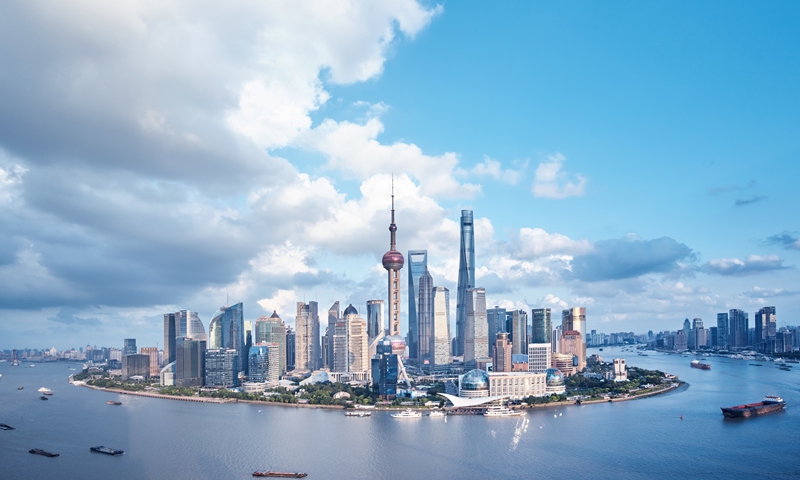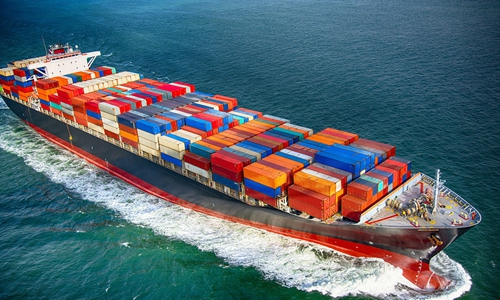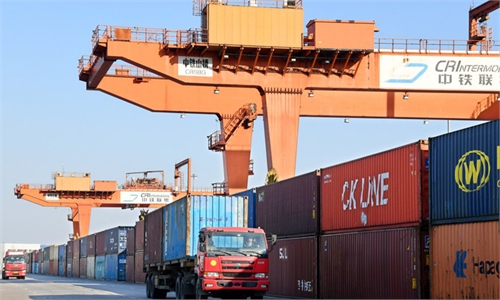After leaders’ meeting, China promotes multilateral trade, while US seeks deal with allies
US pushes for deal with Asia Pacific allies as bilateral ties in focus

A view of the Lujiazui area, a financial zone, in Shanghai Photo: VCG
Senior Chinese officials have sent clear signals that China will hold an unwavering stance on further opening up to foreign businesses and promoting global cooperation to tackle rising global economic and trade challenges amid the COVID-19 pandemic, as global attention has been focused on potential cooperation between China and the US following a high-stakes leaders meeting on Tuesday.The messages in support of global multilateral trade from Chinese officials also came as the WTO has called for unwinding trade integration and enhanced regional and multilateral cooperation and warned against isolationism, amid persistent challenges in global trade.
"China cannot develop in isolation from the world and nor can the world develop without China," Chinese Vice President Wang Qishan said in a virtual speech on Wednesday at the Bloomberg New Economy Forum held in Singapore. "China will not waver in its resolve to deepen reform and expand opening-up," Wang said, Bloomberg reported.
Wang said that the China-US relationship affects the future of the world, and both sides should "act on the important common understandings reached between the two presidents, keep their focus on cooperation, and manage and control differences."
Wang's speech came a day after the top leaders of China and the US held their first face-to-face virtual meeting on Tuesday, during which the two sides also discussed trade and economic issues of mutual concern, and reached a consensus on ramping up communication about each other's economic policies.
The constructive tone of the high-stakes meeting has attracted widespread global attention, with many calling for improved communication and cooperation between the world's two biggest economies.
Also speaking at the Bloomberg New Economy Forum, Henry Kissinger, former US Secretary of State, also said that the meeting was the first step toward averting conflict between the two countries after years of tension.
Experts also called for cooperation between the two countries, as the world economy continues to face profound challenges. In a report on Tuesday, the WTO called for unwinding trade integration and more multilateral cooperation. "Reinvigorated international cooperation, not a retreat into isolationism, is the more promising path to resilience," said WTO Director-General Ngozi Okonjo-Iweala.
"Facing the current difficulties, we could see the Chinese government has not stopped its pace in continuing its reform and opening-up and contributing its part to the world's economic growth," Liu Ying, a research fellow at the Chongyang Institute for Financial Studies at Renmin University of China in Beijing, told the Global Times on Wednesday.
Speaking with business leaders in a Special Dialogue convened by the World Economic Forum on Tuesday, Premier Li Keqiang also stressed that "we want to work with all countries to fight the pandemic and promote economic recovery. We need to keep industry and supply chains stable, and we need to enhance coordination of macro policies. Above all, we must remain committed to peace and development."
Liu pointed out that China has made substantial efforts in promoting global free trade and cooperation to a higher level, and it has taken genuine measures in implementing its commitment to open wider at its own pace. "China's opening-up is not specifically aimed at a certain region, but the entire world," she said.
In the first 10 months of 2021, foreign direct investment (FDI) in actual use in China reached 943.15 billion yuan ($147.78 billion), an increase of 17.8 percent year-on-year, data from the Ministry of Commerce showed.
In terms of free trade, China and nine other countries have completed necessary ratification process for the Regional Comprehensive Economic Partnership, or RCEP, which is set to take effect on January 1. China in September officially applied to join the Comprehensive and Progressive Agreement for Trans-Pacific Partnership (CPTPP).
At Wednesday's Bloomberg New Economy Forum, US Secretary of Commerce Gina Raimondo said the US will not join the CPTPP now for various reasons, but it is pursuing other partnerships with its allies in specific areas such as supply chains, according to a report by the Straits Times.
While the move has been viewed as another attempt by the US to counter China in the region, Raimondo said, according to Reuters, that "this isn't about China. This is about developing robust commercial and economic relationships with our partners in the Indo Pacific."
However, such a move will not change China's efforts to promote regional and global free trade, experts said.
"In the past 20 years, China has grown from a new member of the WTO to a well-deserved flag-bearer of freedom in the global trading system. In comparison, the US mentality is now more focused on closure, and the different mentalities and development routes will determine the direction of their relative strengths in the future," Mei Xinyu, a research fellow at the Chinese Academy of International Trade and Economic Cooperation of China's Ministry of Commerce, told the Global Times on Wednesday.
Mei said he doubts that the path the US is taking - deviating from the multilateral trading system and moving toward small circles - can reverse the declining trend of its competitiveness.


